
|
Urban UndergroundsGarcía, Patricia, ; Pike, David L. : Urban Undergrounds : Contemporary literary and cultural Perspectives Research in urban development in the social sciences has increasingly emphasized the importance of underground infrastructure for envisaging sustainable cities and for critiquing the economies of extraction. Urban Undergrounds: Contemporary Literary and Cultural Perspectives demonstrates the urgency of integrating a below-ground perspective into the emerging field of the Urban Humanities. The collection is divided into three thematic sections that cluster and revisit different sets of well-known motifs in Underground Studies: “Displaced”, “Buried” and “Wasted”. It showcases the intermedial nature of underground-focused analyses in literature, extending from literary texts to a wider range of cultural forms, including films, graphic novels and videogames. The contributors build on recent scholarship that has expanded the field into new interdisciplinary areas, including intersections with memory studies, ecocriticism and decolonial perspectives. Urban Undergrounds also explores lesser-studied subterranes, including those of Warsaw, Athens, Mexico City, Johannesburg and Santiago de Chile. The book’s substantial introduction offers a guiding theoretical and methodological framework for future scholars working with underground perspectives in literary and cultural studies. This thought-provoking and illuminating collection is a valuable resource for students and scholars in the areas of Literary Urban Studies, Underground Studies and Geocriticism, and more broadly in the Urban Humanities and Spatial Humanities. (Verlagstext) Hinzugefügt am 6.11.2025
|

|
Ukrainian Literature in the Twentieth Century : A Reader's GuideLuckyj, George : Ukrainian Literature in the Twentieth Century : A Reader's Guide George S.N. Luckyj provides a survey of the main literary trends of Ukraine, its chief authors, and their works, as seem against the historical background of the present century. Luckyj provides information about literary developments both in Ukraine and in the Ukrainian emigration and diaspora. Hinzugefügt am 25.09.2025
|

|
Grammatikhandbuch des Kroatischen : unter Einschluss des SerbischenKunzmann-Müller, Barbara : Grammatikhandbuch des Kroatischen : unter Einschluss des Serbischen Mit dem Handbuch des Kroatischen unter Einschluss des Serbischen wird die durchgesehene und ergänzte dritte Auflage des gleichnamigen Titels (Neubearbeitung 1999, zuerst 1996) vorgelegt. Die Einleitung befasst sich umfassend mit der genealogischen Einordnung des Kroatischen und geht u.a. auf die gegenwärtig divergierende Entwicklung des Kroatischen und Serbischen ein. Den Hauptteil bildet die ausführliche, an Methoden der modernen Sprachwissenschaft angelehnte Beschreibung des grammatischen Systems des Kroatischen mit seinen Komponenten Morphonologie, Morphologie und Syntax einschließlich erkennbarer Entwicklungstendenzen. Dem Umstand, dass sich das Werk vorrangig an Nutzer mit deutscher Muttersprache wendet, ist dadurch Rechnung getragen, dass entsprechend auf Parallelen und Unterschiede zum Deutschen hingewiesen wird. Verwiesen wird auch auf Besonderheiten des Serbischen. (Verlagstext) Hinzugefügt am 17.09.2025
|

|
F. M. Dostojevskij : eine Einführung in Leben, Werk und WirkungKluge, Rolf-Dieter: F. M. Dostojevskij : eine Einführung in Leben, Werk und Wirkung 200 Jahre Dostojevskij: Eine gut lesbare Einführung in das dramatische Leben des großen russischen Autors, die Zeitumstände und Problematik seiner Romane und Erzählungen, die bis heute in der Weltliteratur aktuell und anregend geblieben sind. Seine Themen sind Verbannung und Läuterung in Sibirien (Aufzeichnungen aus einem Toten Haus); Geist der Verneinung und personifizierte Bosheit (Aufzeichnungen aus dem Untergrund); Verbrechen und Strafe (Schuld und Sühne, der „größte Kriminalroman aller Zeiten“ [Thomas Mann]); Spielleidenschaft bis zum Untergang (Der Spieler); Gutmenschentum und Epilepsie (Der Idiot); Terrorismus und Nihilismus (Die Dämonen); Vater-Sohn-Konflikt und pubertäre Geltungssucht (Der Jüngling); Vatermord, Rechtsunsicherheit und persönliche Verantwortung (Die Brüder Karamazov); Nationalismus und Versöhnung (Tagebuch eines Schriftstellers). (Verlagstext) Hinzugefügt am 2.09.2025
|

|
Linguistik des Russischen : Grundlagen der formal-funktionalen BeschreibungLehmann, Volkmar : Linguistik des Russischen : Grundlagen der formal-funktionalen Beschreibung Dieses Buch dient der linguistischen Beschreibung des Russischen. Es gibt einen detaillierten Überblick über die dafür notwendigen grundlegenden Begriffe und die allgemeinen Eigenschaften der Sprache. Die behandelten linguistischen Bereiche umfassen die systemlinguistischen Kategorien von der Lexikologie über die Phonologie und Morphologie bis zur Syntax, die Textlinguistik und die Sozio-, Psycho- und Kontaktlinguistik. Das Buch ist nicht nur eine Einführung, sondern auch ein Studienbuch: Es stellt eine Grundlage für Studierende der Russistik in allen Phasen des Studiums von der Einführung bis zur Examensvorbereitung dar und kann von Lehrenden nicht nur als Basis in linguistischen Einführungen in die Russistik, sondern auch als Einstiegslektüre für thematische Seminare verwendet werden. (Verlagstext) Hinzugefügt am 18.08.2025
|
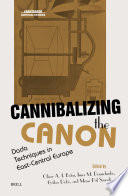
|
Cannibalizing the canon : dada techniques in East Central EuropeOliver A.I. Botar, Irina M. Denischenko, Gábór Dobó, Merse Pál Szeredi (eds.): Cannibalizing the canon : dada techniques in East Central Europe, Leiden : Boston : Brill, [2024] This rich, in-depth exploration of Dada’s roots in East-Central Europe is a vital addition to existing research on Dada and the avant-garde. Through deeply researched case studies and employing novel theoretical approaches, the volume rewrites the history of Dada as a story of cultural and political hybridity, border-crossings, transitions, and transgressions, across political, class and gender lines. Dismantling prevailing notions of Dada as a "Western" movement, the contributors to this volume present East-Central Europe as the locus of Dada activity and techniques. The articles explore how artists from the region pre-figured Dada as well as actively "cannibalized", that is, reabsorbed and further hybridized, a range of avant-garde techniques, thus challenging "Western" cultural hegemony. (Verlagstext) Hinzugefügt am 19.02.2025
|
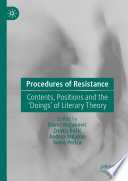
|
Procedured of resistance : contents, positions and the "doings" of literary theoryDavor Beganović, Zrinka Božić, Andrea Milanko, Ivana Perica (Editors) (ed.): Procedured of resistance : contents, positions and the "doings" of literary theory, Cham : Springer, [2024] This volume explores the state of literary theory today, decades after the repeatedly proclaimed end of theory. It builds on the idea that theory is historically constituted as it is “always becoming something else” as Leslie Fiedler claimed in the 1950s, arguing that the historical constitution of theory relies on theory’s procedural nature. In order to assess theory’s procedural challenge to the fundamental notions that all the disciplines within an episteme have brought to the fore, it addresses these questions: What are the procedures theory has relied on? Are they a secret to its resistance, or is resistance its primary procedure? And if so, a resistance to what? Secondly, if resistance were theory’s principal vehicle, at which point does resistance, conceptualized only procedurally (as resisting something, questioning anything, criticizing whatever), display hallmarks of a disciplinary closure that must call for new resistances, and perhapsfor a fundamentally another kind? The book turns to what theory does in order to avoid a partial answer to what theory is. (Verlagstext) Hinzugefügt am 19.02.2025
|
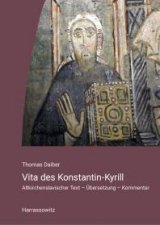
|
Vita des Konstantin-KyrillThomas Daiber: Vita des Konstantin-Kyrill : altkirchenslavischer Text, Übersetzung, Kommentar. [Ann Arbor] : ProQuest Ebook Central, 2023 Die Lebensgeschichte des Konstantin, der kurz vor seinem Tod 869 in Rom den Mönchsnamen Kyrill annahm, stellt eines der wichtigsten Zeugnisse der slavischen Kultur dar. Die Vita erzählt, wie ein begabter und früh zur theologischen Laufbahn entschlossener junger Mann aus dem damals zweisprachigen griechisch-altbulgarischen Saloniki nach Konstantinopel als Prinzenerzieher gerufen wird, dort an den besten Schulen studiert, eine Professur annimmt und bald mit diplomatischen Aufgaben betreut wird. Schließlich wird er zusammen mit seinem älteren Bruder Method in das Großmährische Reich entsandt, um dort das Christentum östlicher Prägung einzuführen. Hinzugefügt am 4.03.2024
|
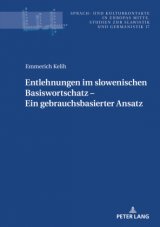
|
Entlehnungen im slowenischen BasiswortschatzEmmerich Kelih: Entlehnungen im slowenischen Basiswortschatz : ein gebrauchsbasierter Ansatz., Berlin : Peter Lang, [2023] Der vorliegende Band bietet eine systematische Analyse des slowenischen Basiswortschatzes im Hinblick auf die in ihm vorkommenden lexikalischen Entlehnungen. Auf der Grundlage einer Wortliste mit über 1400 Bedeutungen und deren Untergliederung in 24 lexikalisch-semantische Gruppen werden die Gesamtanzahl an Entlehnungen und die thematischen Präferenzzonen für Entlehnungen ermittelt. Die chronologische Einordnung zeigt, dass das maßgebliche Inventar an Entlehnungen bereits in früheren Zeiten übernommen wurde. Im Hinblick auf die Gebersprachen sind keine dominanten Einflüsse nachzuweisen. Aus einer gebrauchsbasierten Perspektive zeigt sich, dass die Entlehnungen eine periphere Rolle einnehmen und hauptsächlich im mittel- und niederfrequenten Bereich zu finden sind. Darüber hinaus ist auch ihr semantisches Potenzial begrenzt. (Verlagstext) Hinzugefügt am 4.03.2024
|
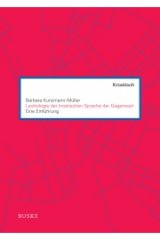
|
Lexikologie der kroatischen Sprache der GegenwartBarbara Kunzmann-Müller unter Mitarbeit von Ana Nemec: Lexikologie der kroatischen Sprache der Gegenwart : eine Einführung. Hamburg : Buske, [2021] Das primäre Interesse der Lexikologie gilt der Inhaltsseite des Wortes: Welche Bedeutung bzw. Bedeutungen werden einem Lautkörper zugeordnet und in welchen Relationen stehen sie zueinander? In 12 Kapiteln ist in detaillierten Unterkapiteln die kroatische Sprache der Gegenwart in deutscher Sprache systematisch beschrieben. Grundbegriffe der Lexikologie werden eingeführt. Hinzugefügt am 4.03.2024
|
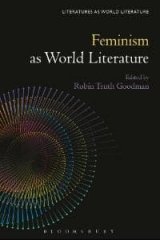
|
Feminism as world literatureRobin Truth Goodman (ed.): Feminism as world literature. New York : Bloomsbury Academic, 2022 The conventional lineage of world literature starts with Goethe and moves through Marx, Said, Moretti, and Damrosch, among others. What if there is another way to trace the lineage starting with Simone de Beauvoir and moving through Hannah Arendt, Julia Kristeva, and Gayatri Spivak? What ideas and issues get left out of the current foundations that have institutionalized world literature, and what can be added, challenged, or changed with this tweaking of the referential terminology? While feminism has always been a worldly endeavor, the field of world literature seems to skirt away from considering feminism and applying this First-World category to non-First-World contexts. Feminism as World Literature challenges the spatial concept of world literature by reorienting the field’s central directions and concerns. Just as "economy" is currently thought of in terms of global circulation, domination, and power but was once a word noting "household management," other ideas built into world literature and its criticism are viewed here by feminist framings, including the environment, technology, immigration, translation, work, race, governance, image, sound, religion, affect, violence, media, future, and history. In other words, this volume looks to readings and modes of reading that expose how the historical worldliness of texts allows for feminist interventions that might not sit clearly or comfortably on the surfaces. (Verlagstext) Hinzugefügt am 4.03.2024
|
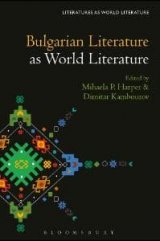
|
Bulgarian literature as world literatureDimitar Kambourov, Mihaela P. Harper (ed.): Bulgarian literature as world literature. New York : Bloomsbury Academic, 2020 Bulgarian Literature as World Literature examines key aspects and manifestations of 20th- and 21st-century Bulgarian literature by way of the global literary landscape. The first volume to bring together in English the perspectives of prominent writers, translators, and scholars of Bulgarian literature and culture, this long-overdue collection identifies correlations between national and world aesthetic ideologies and literary traditions. It situates Bulgarian literature within an array of contexts and foregrounds a complex interplay of changing internal and external forces. These forces shaped not only the first collaborative efforts at the turn of the 20th century to insert Bulgarian literature into the world’s literary repository but also the work of contemporary Bulgarian diaspora authors. Mapping histories, geographies, economies, and genetics, the contributors assess the magnitudes and directions of such forces in order to articulate how a distinctly national, “minor” literature produced for internal use and nearly invisible globally until the last decade transforms into world literature today. (Verlagstext) Hinzugefügt am 4.03.2024
|
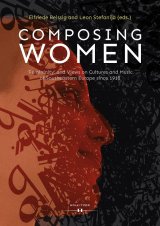
|
Composing womenElfriede Reissig, Leon Stefanija (ed.): Composing women : "femininity" and views on cultures, gender and music of Southeastern Europe since 1918. [Ann Arbor] : ProQuest Ebook Central, 2022 This volume presents fifteen musicological perspectives on the creativity of women composers and the question of 'femininity' in Southeastern-European musical cultures from 1918 on. In the questions about and beyond a 'female aesthetics', socio-cultural approaches to the lives of creative women prove to be indispensable for contemporary musicological gender research, because highly complex facts of musical life and social realities in political systems cannot be separated from each other. Hinzugefügt am 4.03.2024
|
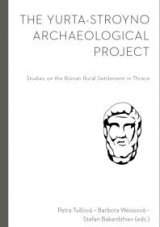
|
Politika lesaMichal Hořejší: Politika lesa : Debata o Národním parku Šumava : v letech 1991- 2010. Praha: Filozofická Fakulta Univerzity Karlovy, 2022 The Yurta-Stroyno Archaeological Project investigated a Roman rural settlement located along the middle stream of the Tundzha River, in south-eastern Bulgaria (Roman province of Thrace). The main objectives of the project were the determination of the habitation dynamics of the settlement, the investigation of its architectural appearance and general function, as well as its possible relation to the Roman military camp in Kabyle. This volume brings together studies on the settlement?s investigation, including the excavation and surface survey, as well as individual articles dealing with different aspects of the settlement existence and material culture. (Verlagstext) Hinzugefügt am 4.03.2024
|
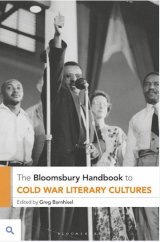
|
The Bloomsbury handbook to Cold War literary culturesGreg Barnhisel (ed.): The Bloomsbury handbook to Cold War literary cultures, [Ann Arbor] : ProQuest Ebook Central, 2022 Adopting a unique historical approach to its subject and with a particular focus on the institutions involved in the creation, dissemination, and reception of literature, this handbook surveys the way in which the Cold War shaped literature and literary production, and how literature affected the course of the Cold War. To do so, in addition to more 'traditional' sources it uses institutions like MFA programs, university literature departments, book-review sections of newspapers, publishing houses, non-governmental cultural agencies, libraries, and literary magazines as a way to understand works of the period differently. Broad in both their geographical range and the range of writers they cover, the book's essays examine works of mainstream American literary fiction from writers such as Roth, Updike and Faulkner, as well as moving beyond the U.S. and the U.K. to detail how writers and readers from countries including, but not limited to, Taiwan, Japan, Uganda, South Africa, India, Cuba, the USSR, and the Czech Republic engaged with and contributed to Anglo-American literary texts and institutions. (Verlagstext) Hinzugefügt am 19.02.2024
|
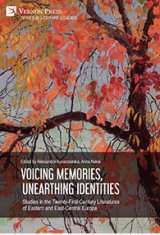
|
Voicing memories, unearthing identitiesAleksandra Konarzewska, Anna Nakai (ed.): Voicing memories, unearthing identities : studies in the twenty-first-century literatures of Eastern and East-Central Europe, [Ann Arbor] : ProQuest Ebook Central, [2023] In the region known as Eastern and East-Central Europe, the framework provided by memory studies became highly valuable for understanding the overload of interpretations and conflicting perspectives on events during the twentieth century. The trauma of two world wars, the development of collective consciousness according to national and ethnic categories, stories of the trampled lands and lives of people, and resistance to the rule of authoritarian and totalitarian terrors—these trajectories left complex layers of identities to unfold. The following volume addresses the issue of identity as a pivot in studies of memory and literature. In this context, it addresses the question of cultural negotiation as it took shape between memory and literature, history and literature, and memory and history, with the help of contemporary authors and their works. The authors take the literature of countries such as Estonia, Poland, Serbia, Ukraine, and Russia as the point of departure, and explain its significance in terms of geographical, theoretical, and thematic perspectives. (Verlagstext) Hinzugefügt am 19.02.2024
|
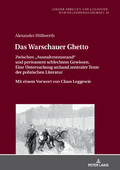
|
Das Warschauer Ghetto : zwischen "Ausnahmezustand" und permanent schlechtem GewissenAlexander Höllwerth; mit einem Vorwort von Claus Leggewie: Das Warschauer Ghetto : zwischen "Ausnahmezustand" und permanent schlechtem Gewissen : eine Untersuchung anhand zentraler Texte der polnischen Literatur. Berlin: Peter Lang, 2020 Der Band beleuchtet das Thema des Warschauer Ghettos in der polnischen Literatur. Die zentralen Kategorien der Untersuchung sind Bachtins «Chronotop»-Konzept sowie Schmitts und Agambens Theorie des «Ausnahmezustands». Das Spektrum der Analyse reicht von Texten aus den 1940er Jahren (Andrzejewski, Miłosz) über solche aus den 1980er Jahren (Rymkiewicz, Błoński) bis hin zu neueren Texten, deren Autoren keine persönliche Erinnerung an die Shoa mehr haben (Ostachowicz). Eine weitere Kategorie der Untersuchung ist die der «Augenzeugenschaft». Sie verleiht der polnischen Literatur - als der Literatur jenes Landes, das sich im Epizentrum des Zivilisationsbruchs der Shoa befunden hat - eine exzeptionelle Bedeutung. Insgesamt bringt dieses Buch eine Reihe von neuen Aspekten in die Erforschung der polnischen und europäischen Shoa-Erinnerungskultur ein. (Verlagstext) Hinzugefügt am 3.01.2021
|
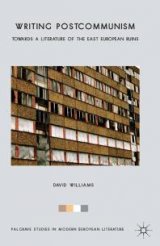
|
Writing PostcommunismDavid Williams: Writing Postcommunism: Towards a Literature of the East European Ruins. London: Palgrave Macmillan, 2013 Moving through the elegiac ruins of the Berlin Wall and the Yugoslav disintegration, Writing Postcommunism explores literary evocations of the pervasive disappointment and mourning that have marked the postcommunist twilight. With particular reference to the writings of Croatian émigré Dubravka Ugrešić, and those of Milan Kundera, Clemens Meyer, Ingo Schulze, Jáchym Topol, Christa Wolf, and others, it is argued that a significant body of postcommunist literature is underpinned and scarred by the semantic field of ruins: melancholia and nostalgia, presence and absence, pride and shame, and not least, remembering and forgetting. Taken together, the writings considered suggest a post-1989 'literature of the ruins', an amorphous, anti-formative framework that also dramatically illuminates the post-1989 ruins of east European literature itself - what remains when, as György Konrád put it, 'something is over'. (Verlagstext) Hinzugefügt am 10.12.2020
|
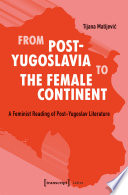
|
From Post-Yugoslavia to the Female ContinentTijana Matijevic: From Post-Yugoslavia to the Female Continent. Bielefeld : transcript-Verlag, [2020] Women's writing from the former/post-Yugoslavia recollects but also produces the links among the post-Yugoslav present and the Yugoslav past - as either those bygone Yugoslav days or the recent war history. Along with a gynocritical intervention that draws attention to an uninterrupted marginalization of women authors, but also structurally confined female narrators and protagonists, Tijana Matijevic conceptualizes the post-Yugoslav literary field, i.e. the contemporary literary production from Bosnia and Herzegovina, Croatia and Serbia. Along this quest to find the Female Continent, post-Yugoslavia has been demarcated and liberated by feminist writing as collective space-building. (Verlagstext) Hinzugefügt am 9.12.2020
|
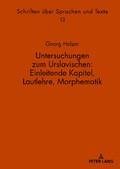
|
Untersuchungen zum UrslavischenGeorg Holzer: Untersuchungen zum Urslavischen: Einleitende Kapitel, Lautlehre, Morphematik. Frankfurt am Main : Peter Lang, 2020 Gegenstand dieses Buches ist das um ca. 600 n. Chr. gesprochene Urslavische. Nach der historischen und geographischen Einordnung und der Bestimmung der soziolinguistischen Funktion dieser Sprache behandelt das Buch theoretisch und empirisch die Frage ihrer Einheitlichkeit. Es folgt die hauptsächlich auf die Lehnbeziehungen des mittelalterlichen Slavischen gestützte Rekonstruktion der Phonetik des Urslavischen und der Lautung und Akzentuierung urslavischer Wörter. Danach werden Bereiche der Morphologie des Urslavischen, insbesondere der Wortbildung, detailliert behandelt, wobei im Wesentlichen auf die Methoden der „generativen Phonologie" zurückgegriffen wird. Auch da wird die urslavische Akzentologie konsequent mitberücksichtigt. (Verlagstext) Hinzugefügt am 9.12.2020
|